Legal minds, AI partners
Artificial intelligence for lawyers
How can AI help law firms and attorneys work more efficiently while reducing manual data entry tasks and providing a consistently high level of client service? Keep reading below to learn more, or get a hands-on look at how firms like Harrelson & Harrelson and Coye Law are using Dialpad Ai!
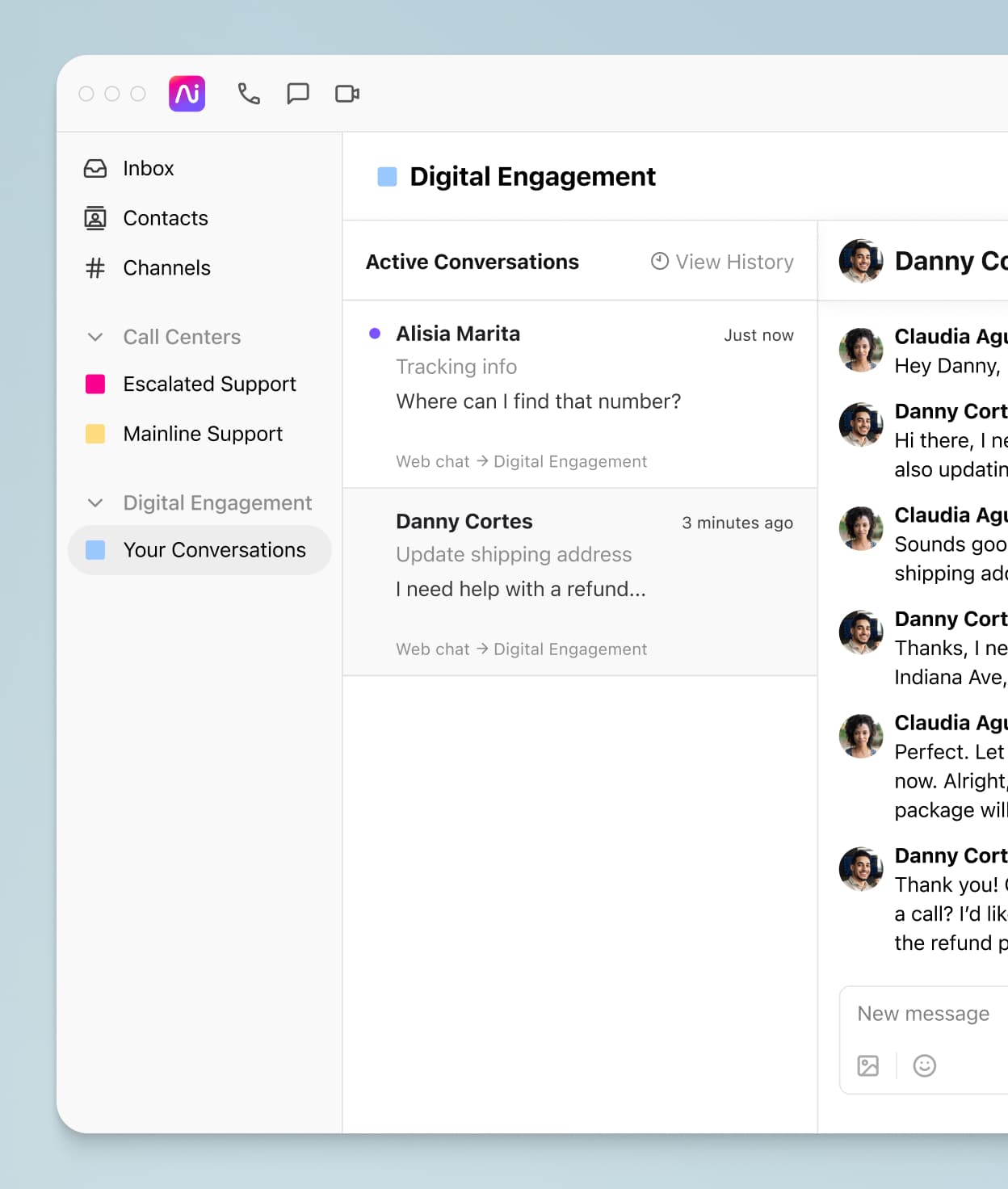
Being a successful attorney today isn’t just about being the best at winning cases anymore.
Whether you’re a partner at a firm or run your own practice, you’re likely facing ever-increasing expectations from clients when it comes to the client experience and other day-to-day challenges like increasing billable hours and “how can we move to a hybrid or remote work-friendly model?”
Even though artificial intelligence is still in its early days when it comes to applications in law firms, it nonetheless is a good idea to start thinking about how your firm could use AI to increase attorneys’ productivity, maintain margins, and just as importantly, provide an excellent client experience.
In this guide, we’ll walk you through what the AI landscape is looking like for attorneys, and how some firms are already using AI to do these things.
What are the uses of artificial intelligence in law firms?
Before we explore how AI can be used in law firms, it’s important to note that out of all the industries, legal is typically one of the last to adopt new technology—and for good reason.
The nature of the work itself is nuanced and complex, and it would be wise to approach something like AI, which is still largely unregulated and untested, with caution.
At the same time, it’s a fact that client expectations and cost pressures have forced many firms to be more creative in how they operate and design their billing models. The American Bar Association itself has written frequently about AI and the practice of law, with a recent piece stating that “AI-based discovery, legal writing, and even sophisticated legal analysis are all here or on the horizon.”
Regardless, there are already some tangible ways in which some firms and attorneys are using AI. Here are a few of them.
1. Automated note-taking and meeting summaries
One simple way in which AI can improve an attorney's productivity is by taking care of note-taking for calls and client meetings.
Traditionally, a note-taker or fast-typing secretary would take on this role. But today, AI has been shown to be an adept transcriber—in real time. In fact, Coye Law Firm replaced its business phone system with an AI-powered communications solution that can transcribe client calls in real time:
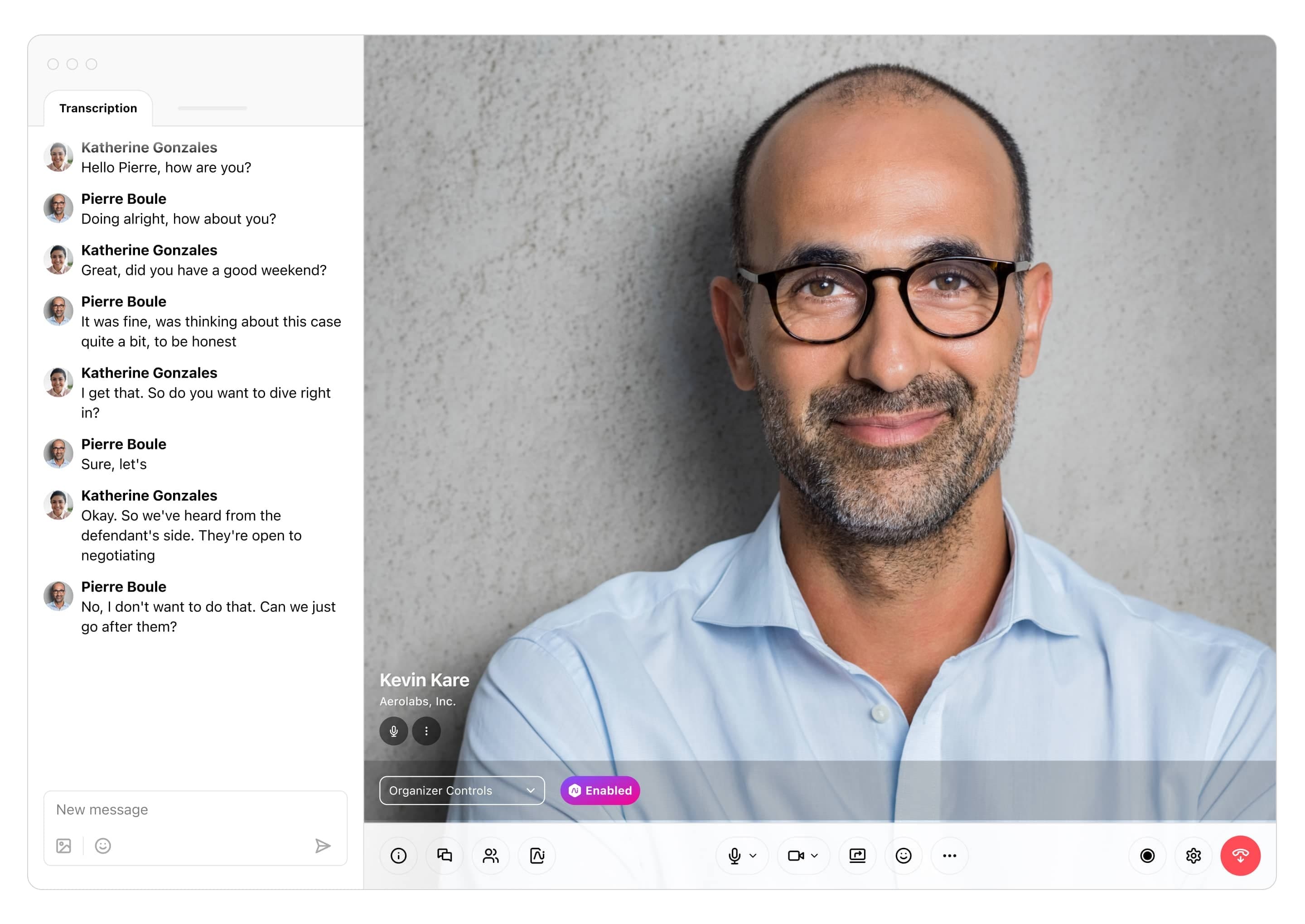
“I had a phone answering service that I was pretty happy with for about two and half decades. And I’ve ditched it now,” says Wade Coye, President and Attorney.
“The ability to get an inbound call and have that speech-to-text transcription in Dialpad—and receive an instant notification of it—is awesome. That made perfect sense for us to get rid of the answering service.”
After the call, Dialpad Ai sends the call summary with the searchable AI-generated transcript, the recording, and key highlights to attendees, which again automates some of the administrative follow-up work that would normally be required:
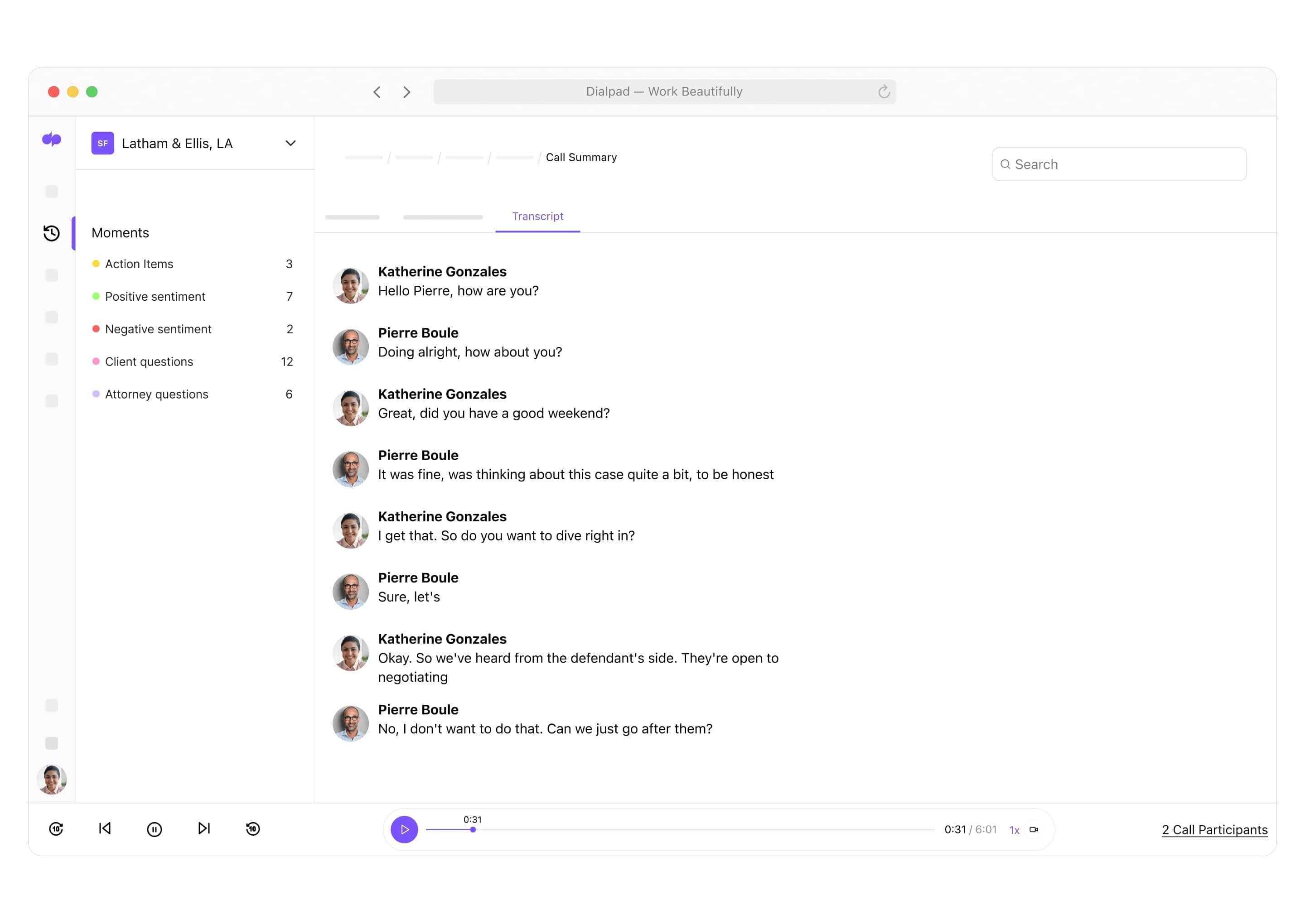
2. Training and onboarding
For law firms that staff employees in a call centre type of environment and/or deal with high case volumes, such as personal injury or defence attorneys, AI can be incredibly helpful for training and onboarding attorneys and other staff more efficiently.
Want to quickly identify areas where attorneys may need additional coaching or support? AI can help with that, from picking out commonly asked questions to providing real-time coaching. For example, if a client raises an objection during a call, the AI can immediately suggest an appropriate response or strategy, helping the attorney navigate the conversation more effectively and consistently deliver high-quality service:
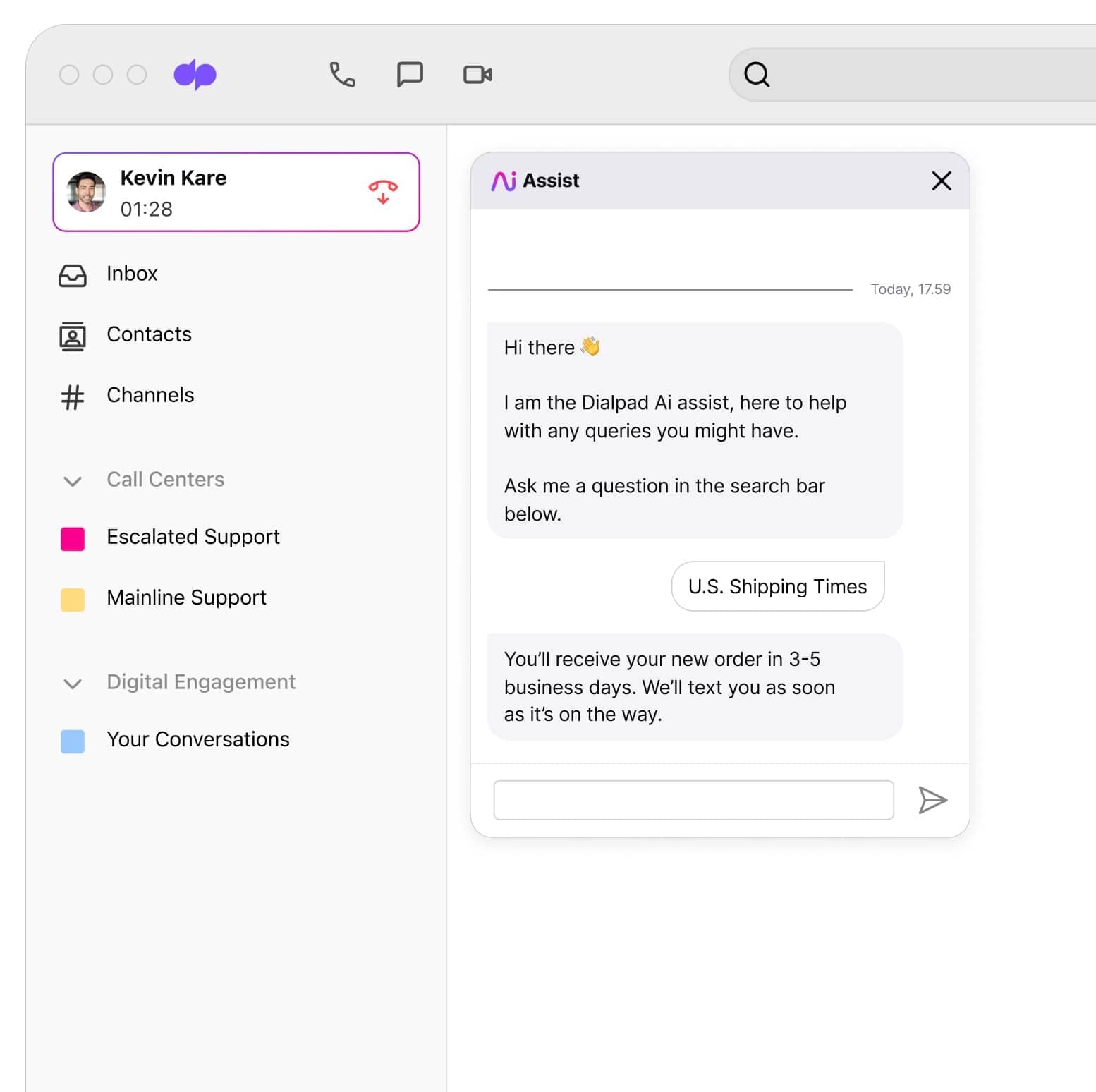
3. Quality assurance for client interactions
For firms with larger intake or service teams, quality assurance is essential. Many supervisors use QA scorecards to evaluate client interactions such as intake calls or consultation sessions, and provide feedback based on specific metrics, such as responsiveness, empathy, and understanding of client needs.
Alternatively, they may also score calls based on regulatory requirements, such as disclosures or other language that must be used during certain client interactions.
But this is quite a manual method of ensuring agent compliance with legal and ethical guidelines. Today, some contact centre solutions such as Dialpad have AI tools that can analyse these conversations automatically (so that supervisors don’t have to listen to every recording from beginning to end) to save time while helping mitigate risk and prevent future compliance breaches.
3. Helping firms maintain compliance
Law firms and other regulated industries like healthcare and insurance may need to adhere to regulatory requirements and/or maintain records of their communications. Having an AI transcription tool can supplement call recordings to provide an accurate record of conversations—this would be possible, for example, with Dialpad’s AI-powered communications solution as mentioned above.
Dialpad Ai can also be set up to identify specific keywords and phrases related to compliance matters, and flag these keywords in real-time:
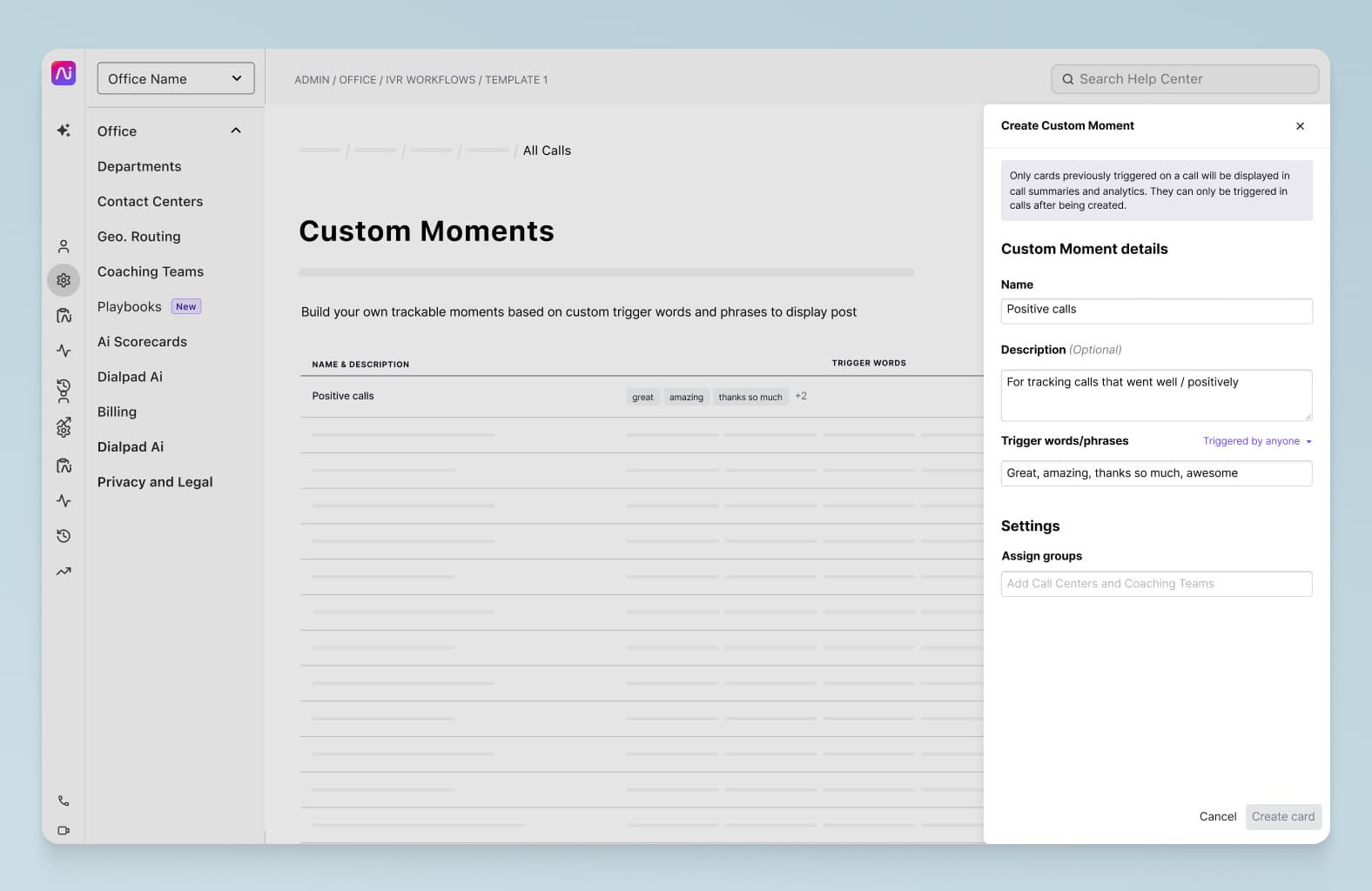
This way, attorneys or compliance officers can instantly see any potential issues and address concerns proactively in real time.
4. Answering high volumes of client questions efficiently
On a related note, AI being able to take notes during a meeting can also improve attorney-client relationships, since attorneys can focus on the conversation instead of worrying about transcribing the meeting or making sure key points get captured.
But not only that, larger firms that receive high call volumes or questions on their websites can also use AI to deflect and respond to many client questions.
For example, conversational AI (essentially a more advanced and versatile chatbot) can do things like handle initial client intake, automate appointment scheduling, and connect representatives to helpful internal knowledge sources to provide answers to FAQs and help clients access self-service resources before reaching out to a live representative at the firm.
A good cloud contact centre platform will let you design these conversational flows to handle your most common queries from clients and prospective clients. For example, with Dialpad Ai Contact Centre, you can create flows like this with the drag-and-drop builder, no coding needed:

On top of that, AI can also analyse sentiment of client calls in real time to provide valuable insights into client satisfaction and feedback, which helps law firms make data-driven decisions to improve client service.
For example, CSAT surveys (customer satisfaction surveys) are one of the most commonly used tools, across all industries, to measure how satisfied clients are with their interactions with a business. Generally, CSAT surveys are sent to clients immediately after an interaction like a support call or a chat conversation.
However, one of the biggest challenges with collecting CSAT scores is that not a lot of people actually fill out these surveys.
In fact (depending on the industry and specific business of course), we've found that on average only about 5% of customers actually fill out CSAT surveys. On a related note, usually only the angriest—and happiest—customers actually bother to respond to these surveys, which means your CSAT answers are likely to be very skewed and not representative of how your clients feel overall.
Dialpad's industry-first Ai CSAT feature is designed to solve exactly that. Not only can the AI transcribe calls and analyse sentiment in real time, it can also infer CSAT scores for 100% of client calls. The result: a much more representative sample size for CSAT scores, and a more accurate understanding of how satisfied your clients really are:
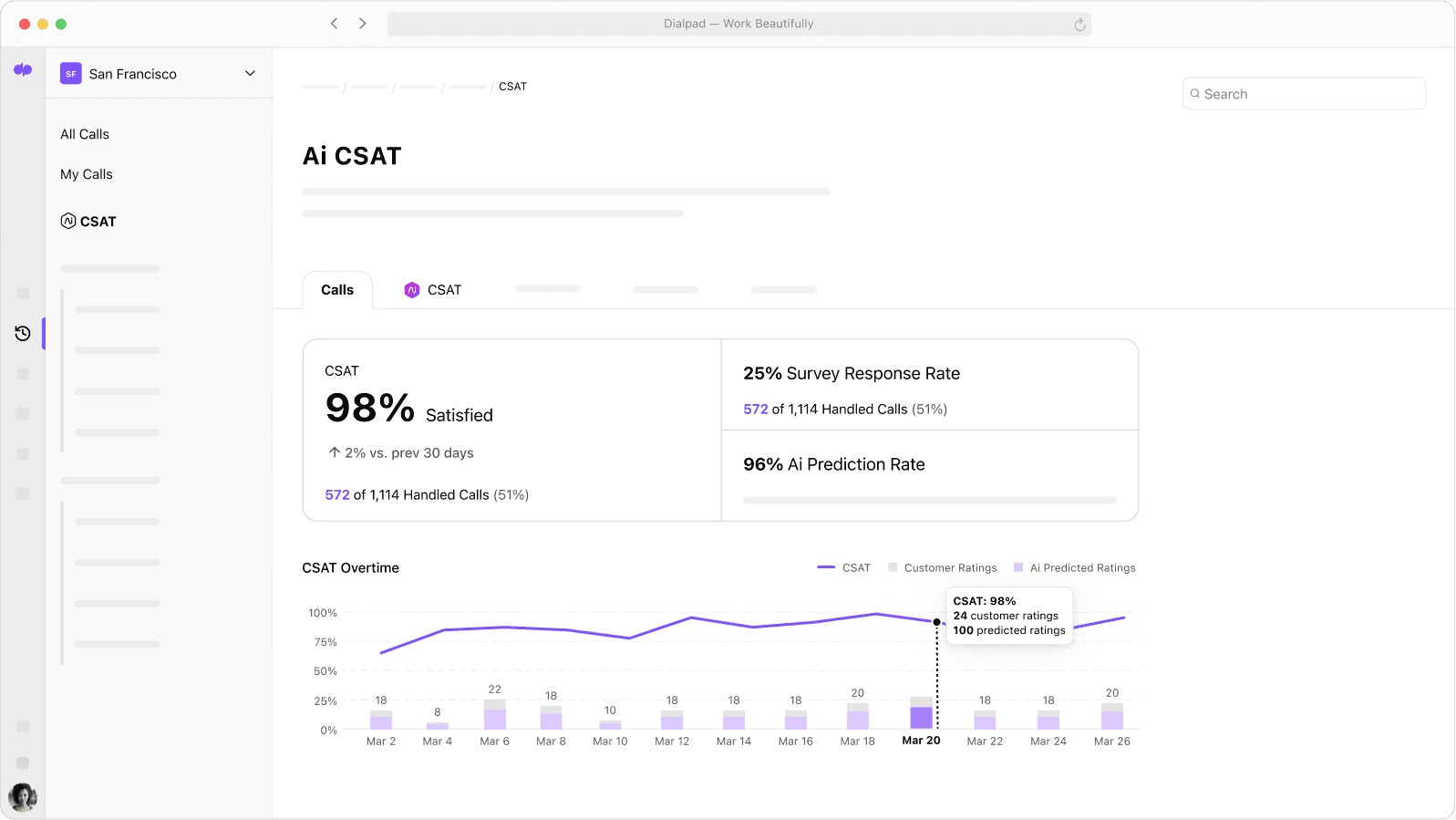
5. Automating document review
According to Thomson Reuters, document reviews are one of the top five tasks outsourced to ALSPs (alternative legal service providers). This can be cost-effective, but there are disadvantages.
“When one segment of the diligence process is done by an external ALSP and another by the client’s primary law firm, the process can be disaggregated and heightens the potential for something critical to slip through the cracks.”
What’s interesting is Thomson Reuters specifically highlighted the benefit of using AI to automate the document review process—and retain more valuable insights and knowledge about these transactions.
6. Generating legal documents
Another time-consuming task for attorneys is drafting legal documents. Today, there are AI tools like FlashLawyer and Legal Aid that claim to be able to generate basic legal documents such as contracts, wills, and leases.
How nuanced these can get is another question, but it already opens the door to how AI can automate yet another essential activity in the practice of law.
7. Conducting legal research
Legal research is another task that is often time-consuming for attorneys, and in fact, some services that attorneys are using may already use AI to conduct research more quickly and efficiently.
By searching through a large number of documents and identifying relevant information. This can help attorneys save time and bill more hours.
Westlaw Edge’s Quick Check, for example, uses AI to examine the text, citations, and structure of an uploaded brief or document to uncover insights and even identify authority that a human may have skimmed over or otherwise missed. It can even recommend cases that refute or oppose an adversary’s argument or position.
The benefits of using artificial intelligence in law
It's no secret that the legal industry is under pressure. Clients are demanding more for less, and law firms are feeling it in their bottom lines. In this time, it's more important than ever to be efficient with the resources you have. And those are precisely the benefits that AI offers law firms.
Greater productivity
By automating manual, repetitive tasks like note-taking and research, lawyers can free up time to focus on higher-value work. This not only makes them more productive, but also helps them bill more hours.
Increased revenue
With the shift away from the billable hours model already underway, firms are finding ways to be more creative with AFAs (alternative fee arrangements) and improving operations in order to increase revenue.
With the many ways in which AI can automate law firms’ activities (among the five discussed above), it will likely be one of the biggest competitive advantages for forward-thinking practices in the near future.
Better client relationships
The billing and payments portion of a client relationship is often the most fraught with tension, with questions of billing transparency, cost expectations, and price-based competition from other firms. It’s not an easy challenge to solve.
But there are factors that can improve the client experience, like proactive communication, clear responses to questions, and so on. These are all things that AI can help with, whether it’s a chatbot on a firm’s website providing answers to client questions 24/7 or an AI secretary taking notes during a meeting so that the attorney can give their full attention to the client.
If I know I’m going into a long conversation with a client, I can focus on the conversation because Dialpad will send me a transcript with highlights after the call. It saves me time, because typically with every client call, I’ll go in and start dictating notes. Now I’ve already got the whole conversation available in text.
Steve Miller
Owner & Attorney, Miller Law Firm
If your practice is facing transactionally based competitors focused on undercutting on price, your quality of client service could be the thing that sets you apart.
How can you build better client relationships with AI?
Whether your practice is an early adopter when it comes to legal technology or more cautious, it’s not too early to start thinking about the implications of AI and how it can improve client communications and productivity.
If you’re interested in learning more about how organisations in regulated industries, like law firms and financial institutions, are already using AI, reach out to our team!
Get a hands-on look at AI for law firms
From transcribing calls in real time to providing live coaching during client conversations, Dialpad Ai is designed to help law firms provide an excellent client experience while working more productively. See how with a demo, or take a self-guided interactive tour of the app first!








